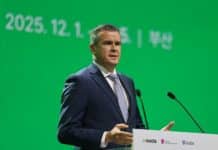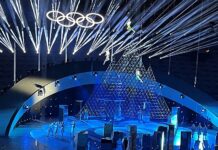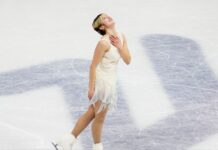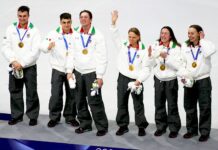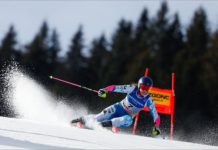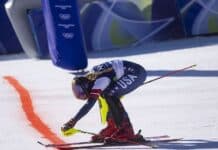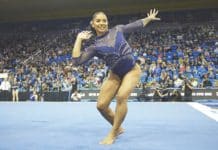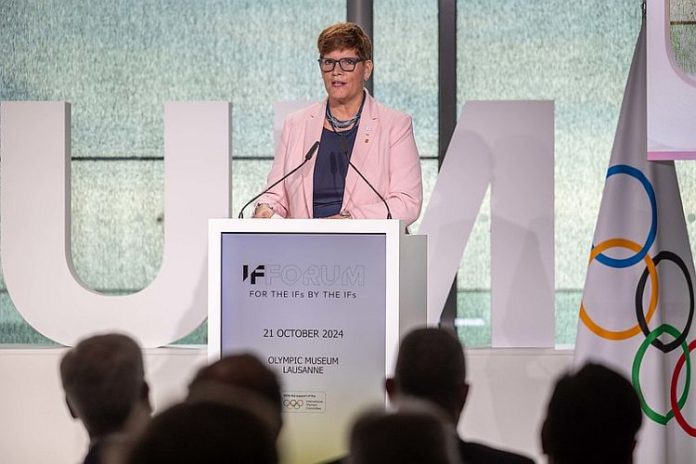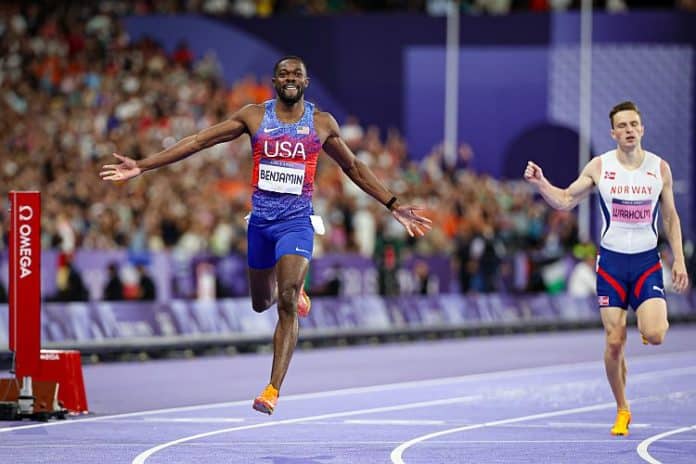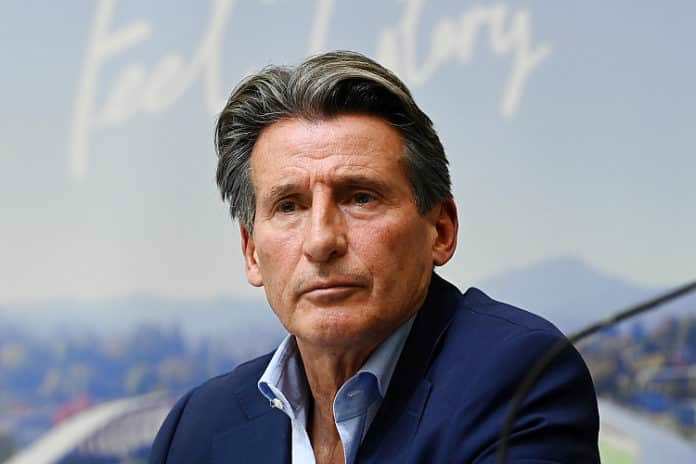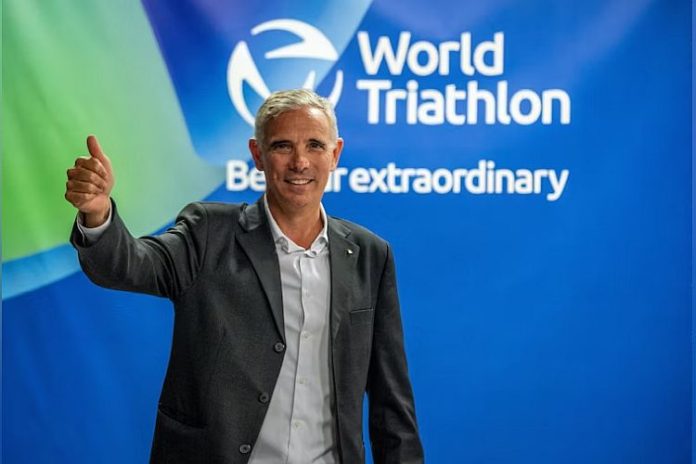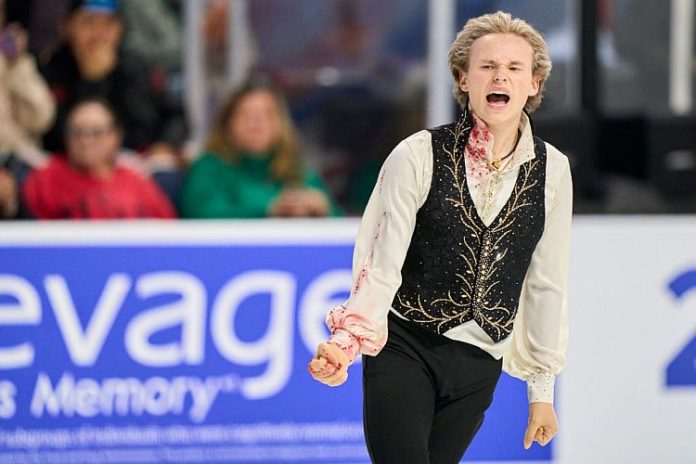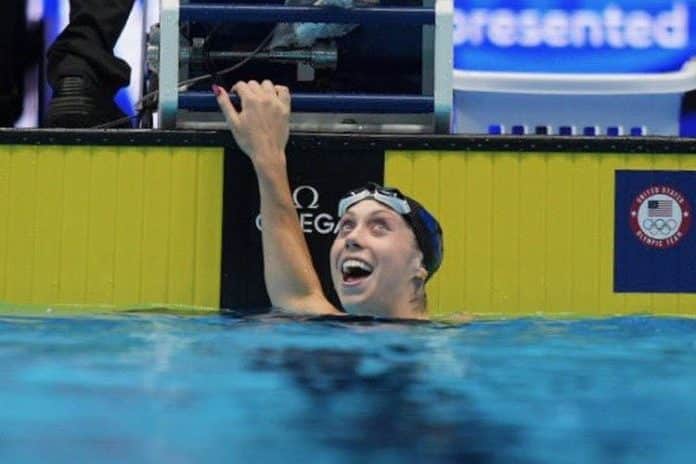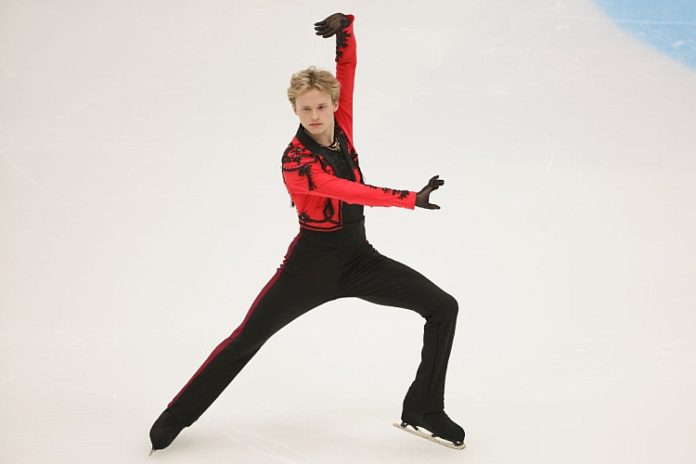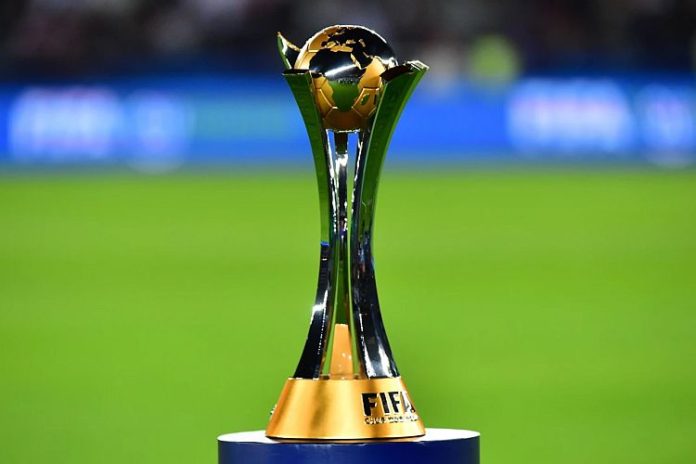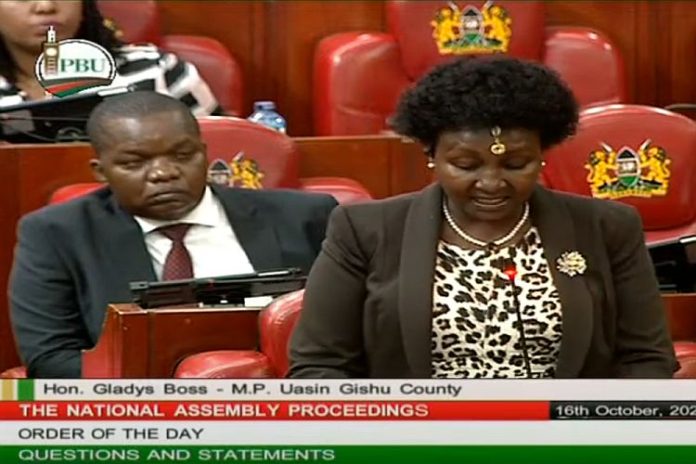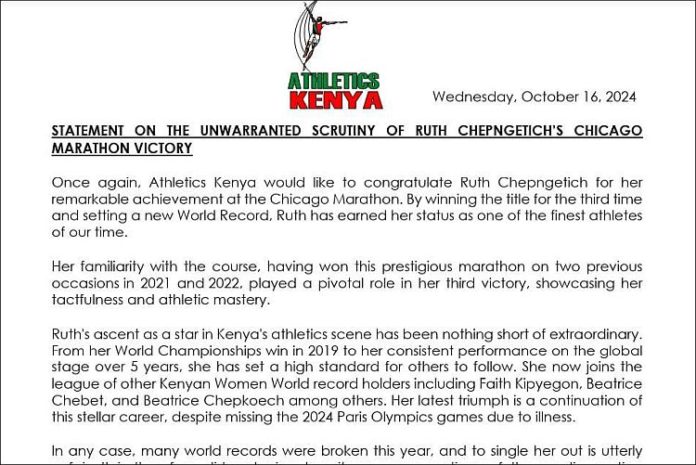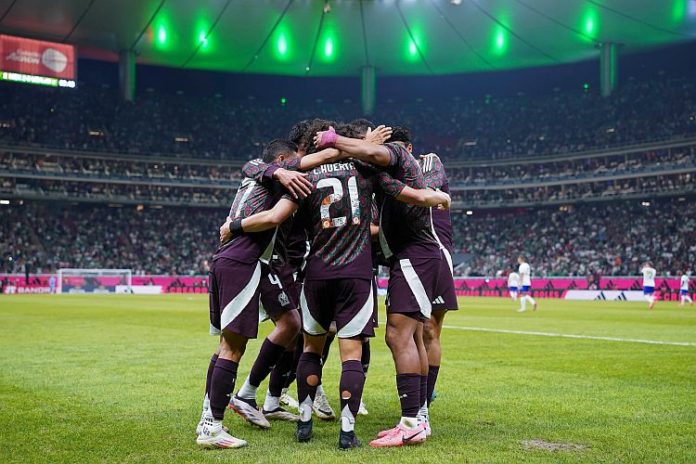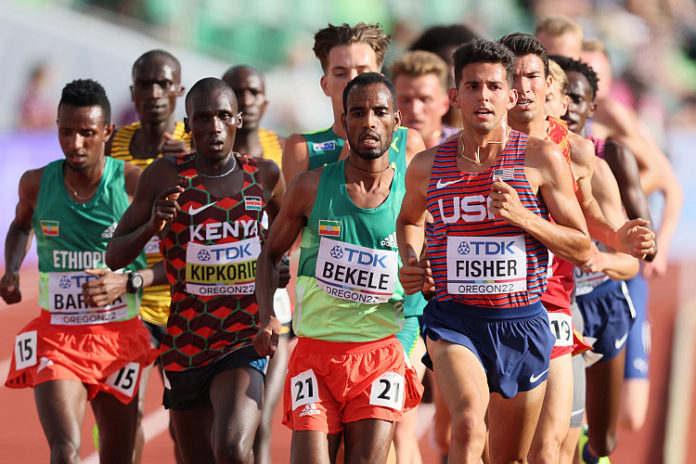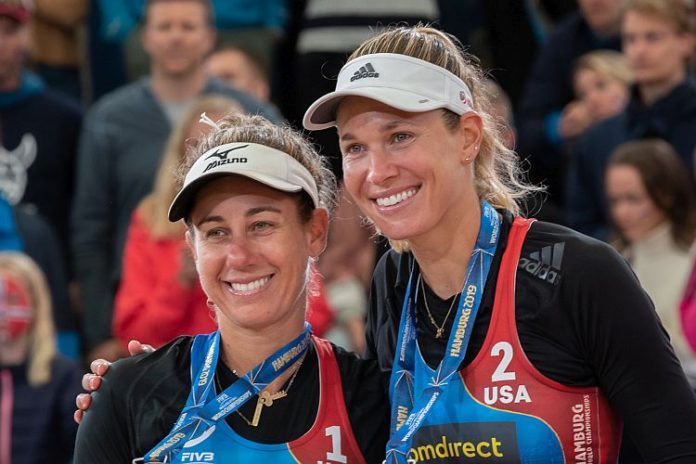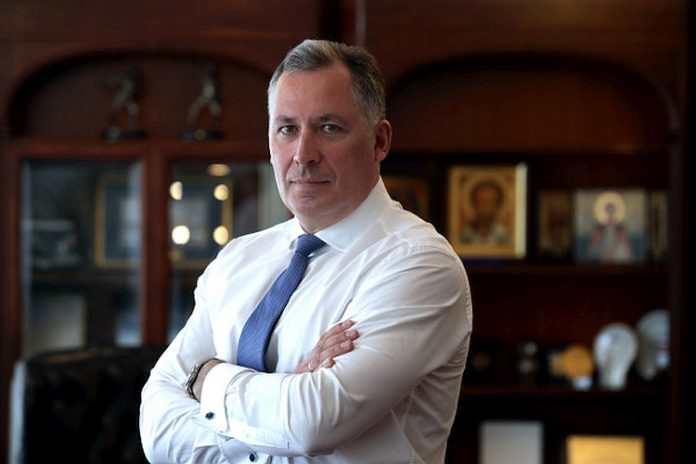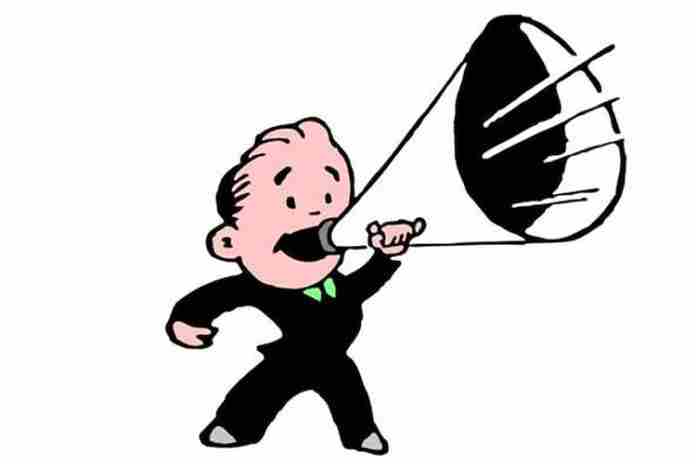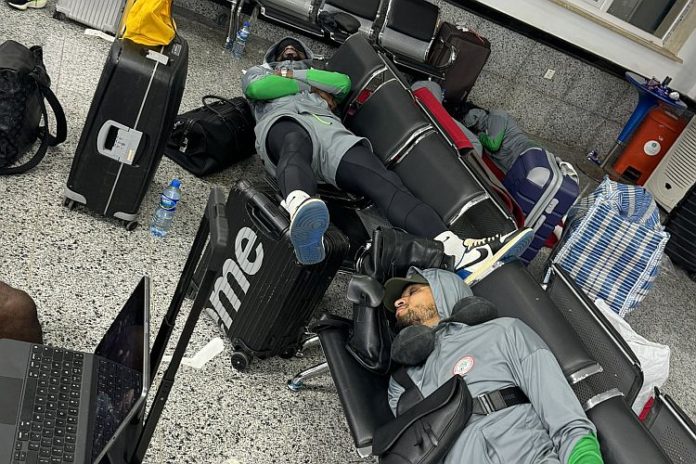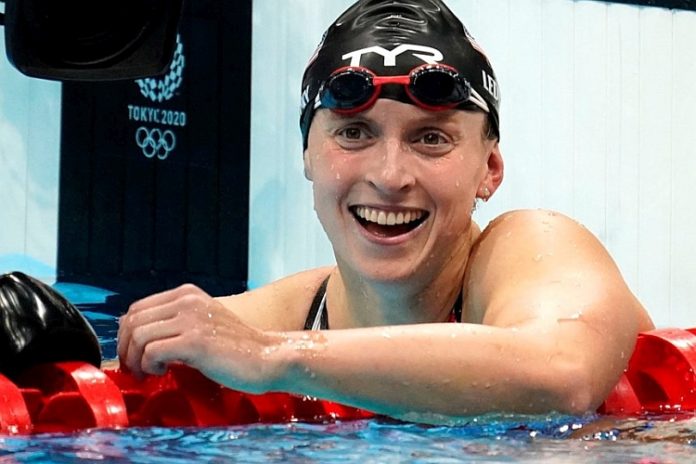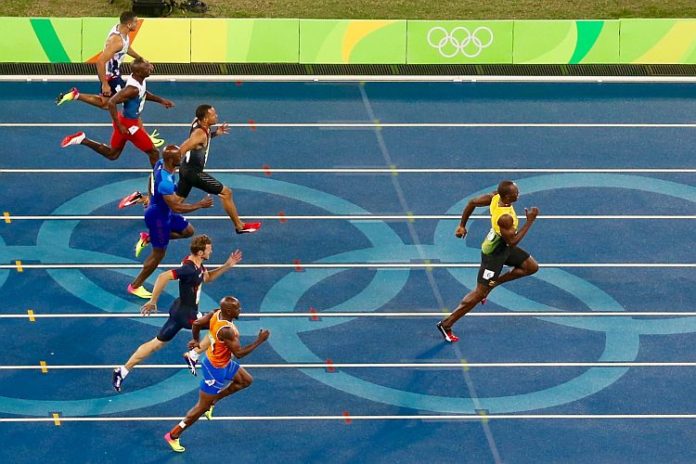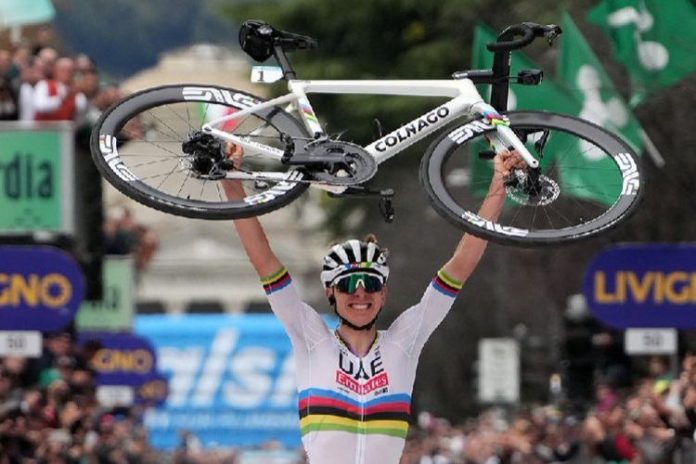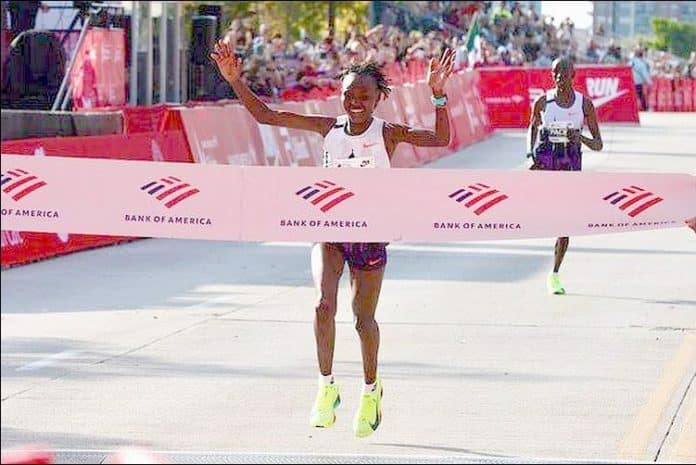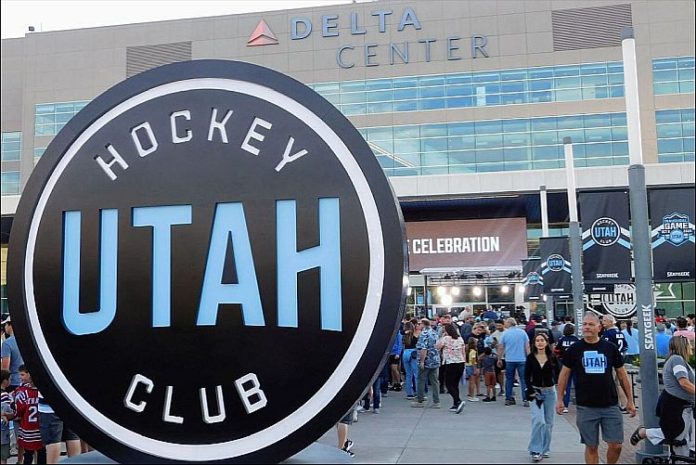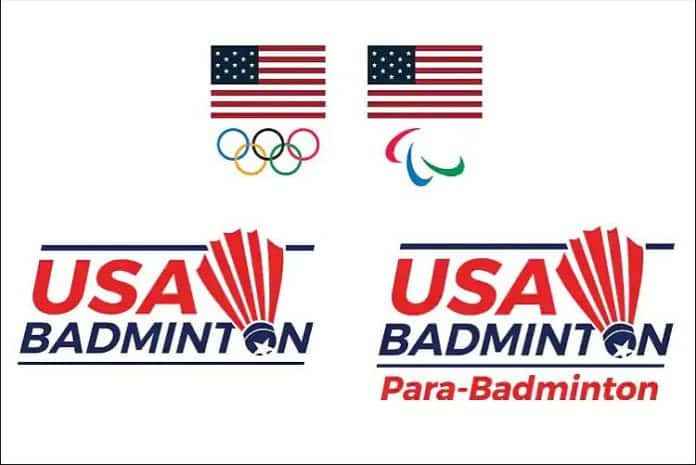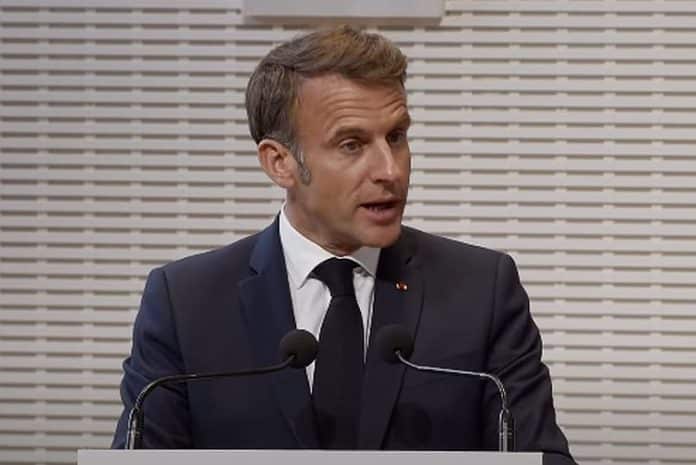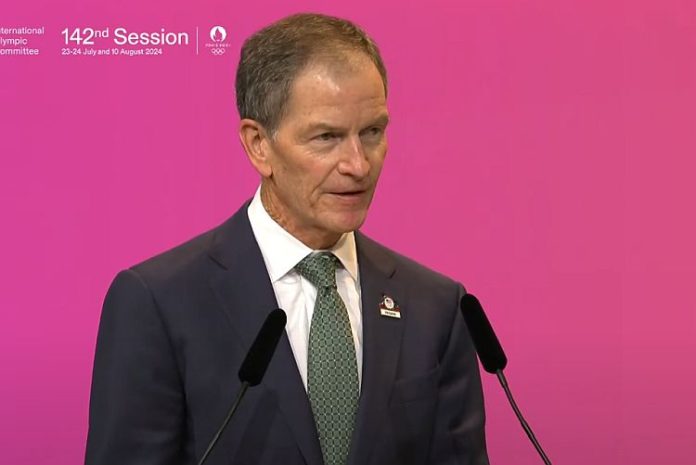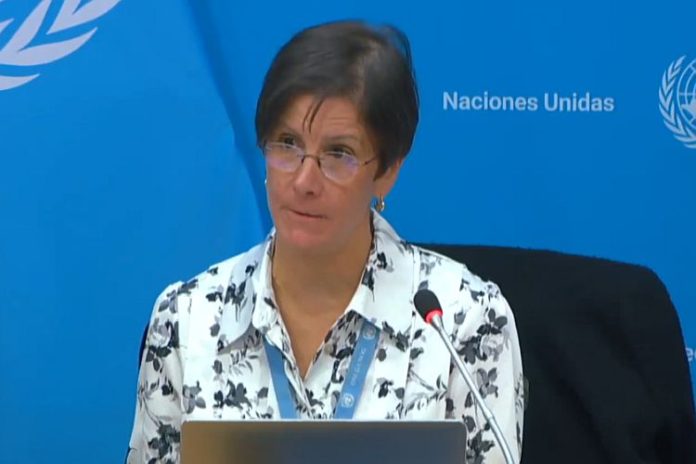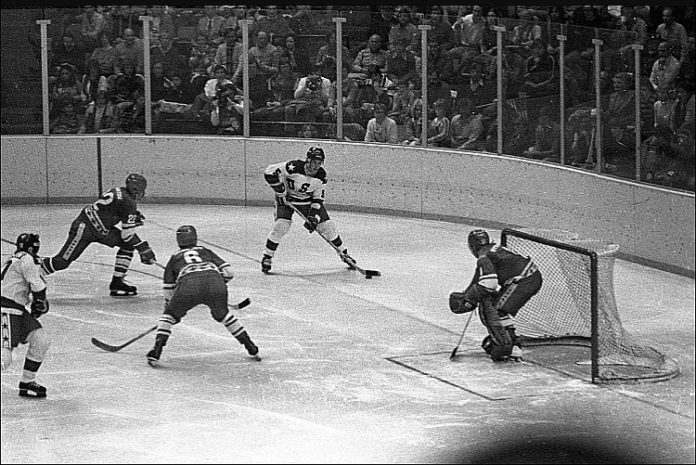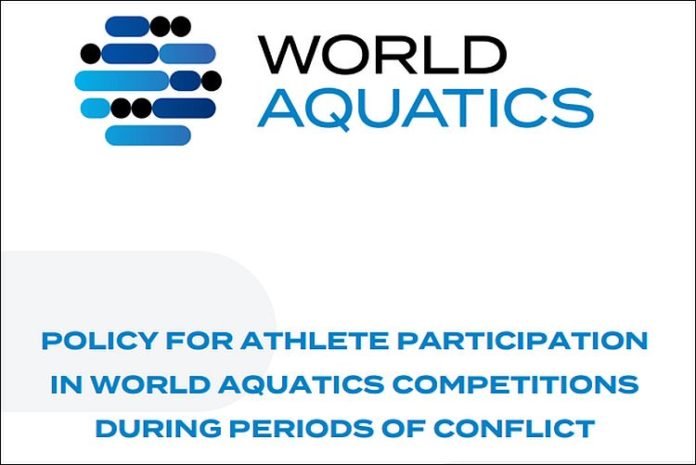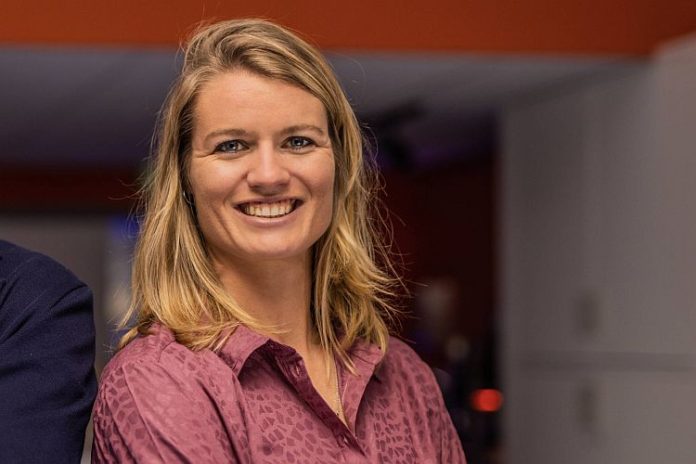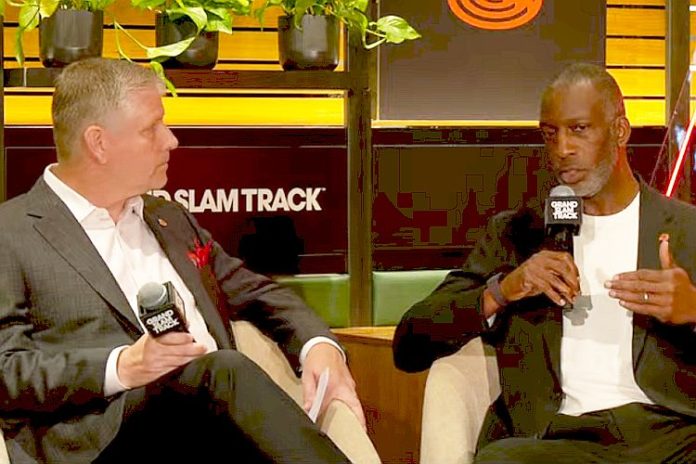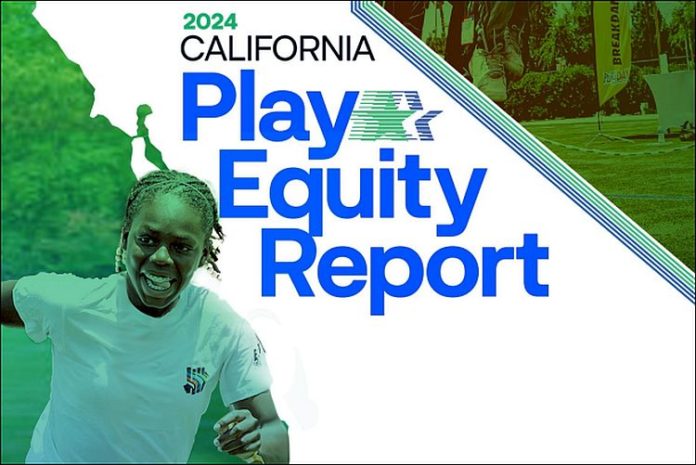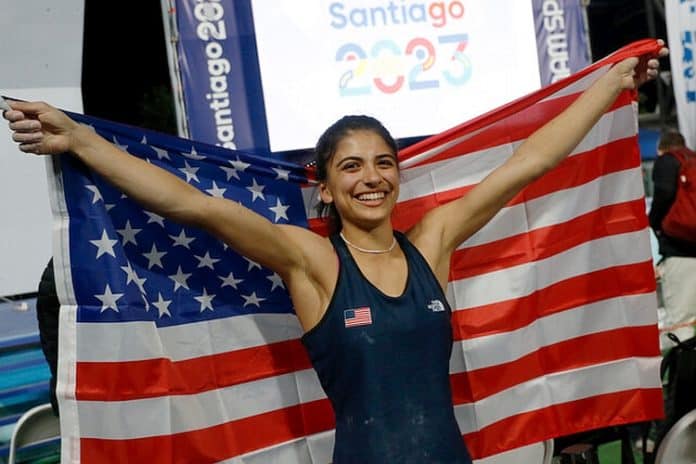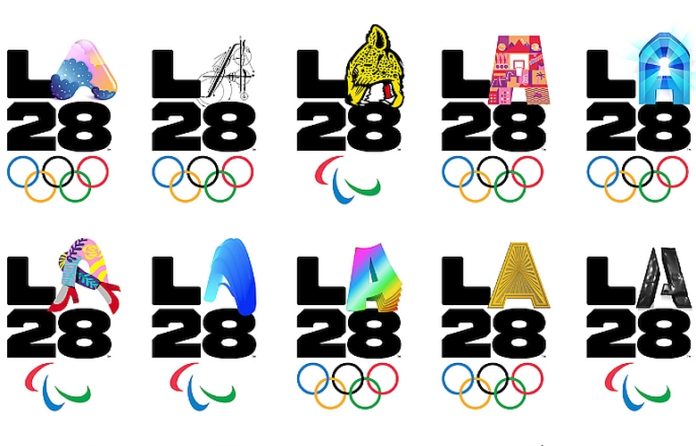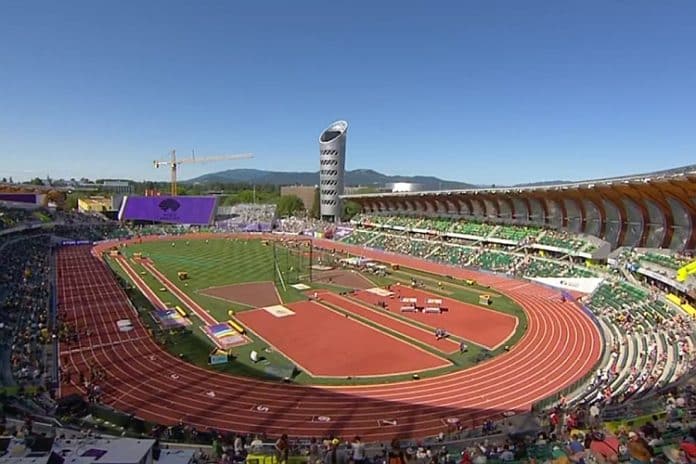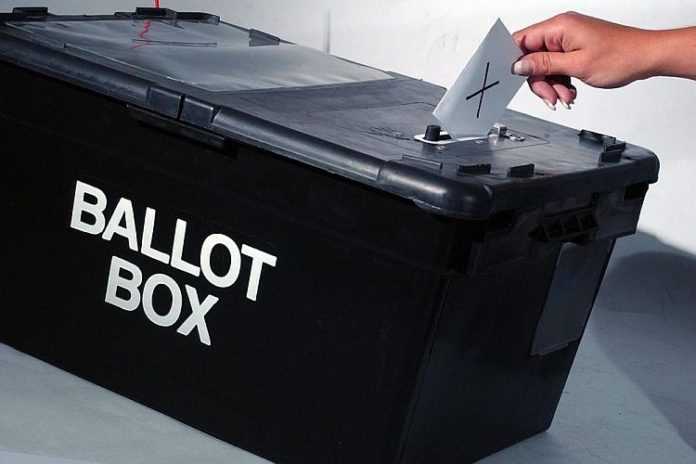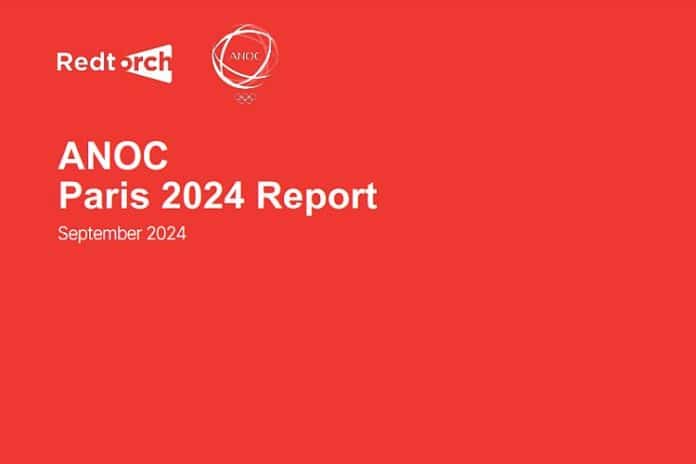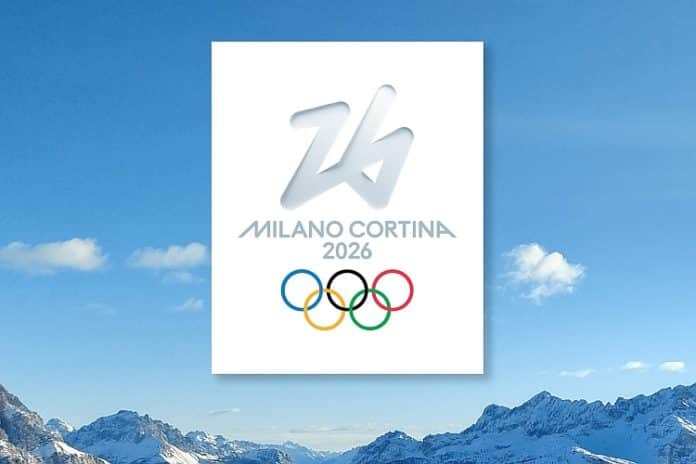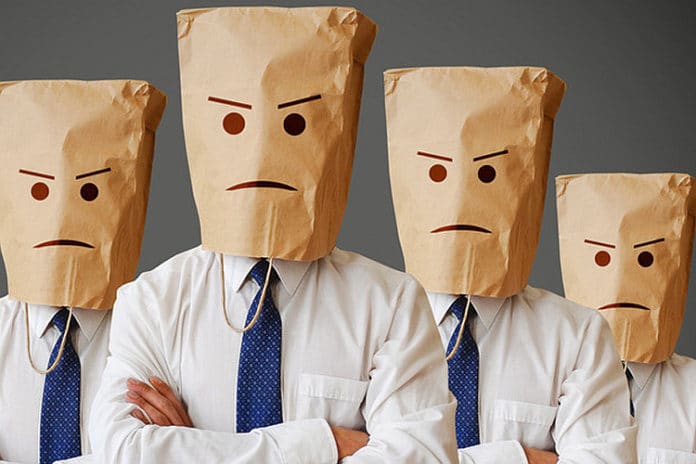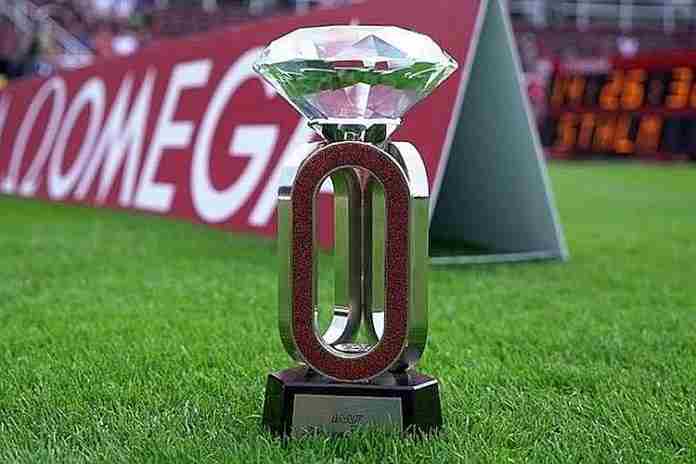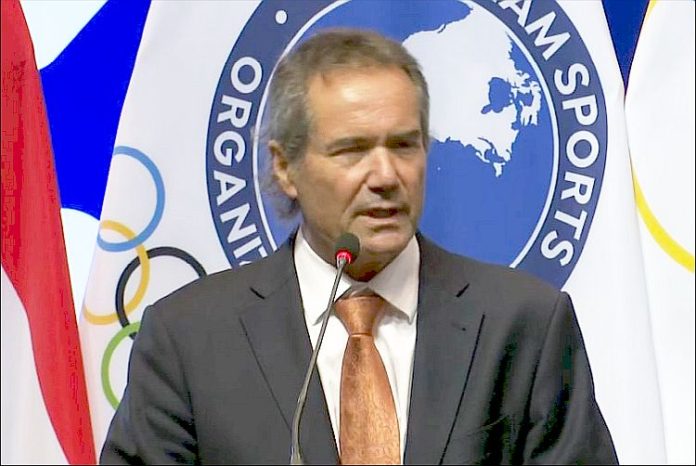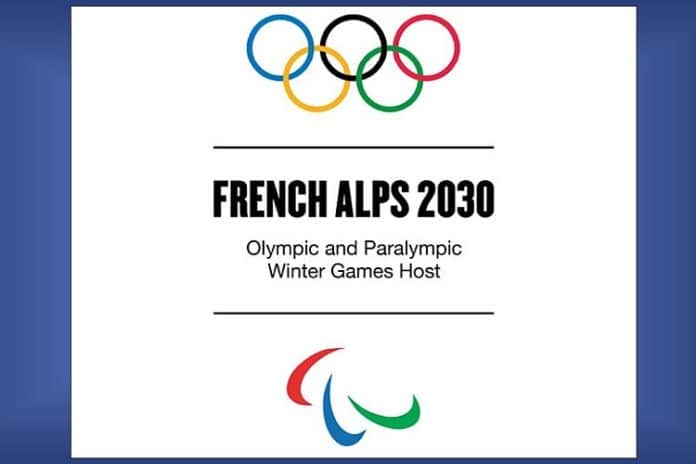★ The Sports Examiner: Chronicling the key competitive, economic and political forces shaping elite sport and the Olympic Movement.★
★ To get the daily Sports Examiner Recap by e-mail: sign up here! ★
≡ THE 5-RING CIRCUS ≡
● Olympic Games 2028: Los Angeles ● LA28 Chair Casey Wasserman said Friday at the Texas Business of Sports Summit in Austin that the 2028 Olympic cricket competition would likely be placed at an eastern venue.
Placing the sport, requested by LA28 to be added to the sports program, on the East Coast will place it in a better time zone for viewers in India, where it is hoped that a much larger Olympic television rights fee will be paid with cricket on the program.
While there are no large, permanent cricket stadiums on the East Coast, a temporary, 34,000-seat facility was successfully mounted at the Nassau County International Cricket Stadium for the 2024 ICC Men’s T-20 World Cup and used for eight matches.
Wasserman gave no specifics on a possible venue.
● Alpine Skiing ● A news release from the Soelden organizers of the FIS Alpine World Cup opener next week says that American star Lindsey Vonn, retired for five years, will return at the Soelden Giant Slalom in Austria.
The 2010 Olympic Downhill champion, Vonn turned 40 on Friday (18th) and owns 82 career World Cup wins. Her last season was in 2019. She has not confirmed her appearance.
● Archery ● Triple Olympic gold medalist Woo-jin Kim completed a dream season at the World Archery World Cup Final in Tlaxcala (MEX), winning the men’s Recurve final, 7-3, against Korean teammate Woo-seok Lee. Lee, also on the Paris Olympic men’s gold-medal team.
It’s Kim’s fifth World Cup individual title. Brazil’s 2021 Worlds runner-up, Marcus D’Almeida, won the bronze by 6-2 over Mexico’s Matias Grande.
Paris Team silver medalist Jiaman Li (CHN) won the women’s title, 6-0, over India’s Deepika Kumari. Mexico’s Alejandra Valencia took the bronze, 6-2, over Hun-young Jeon (KOR).
● Athletics ● Ethiopia swept the men’s and women’s titles at the Amsterdam Marathon (NED) on Sunday, with Yalemzerf Yehualaw, the 2022 London Marathon winner, running away from the women’s field to win by more than two minutes in 2:16:52 to move to no. 9 on the 2024 world list.
The men’s winner was Tsegaye Getachew, the 2022 winner in this race, in 2:05:38, just ahead of countryman Boki Asefa (2:05:40) and Israel’s 2023 Worlds silver medalist Maru Teferi (2:05:42).
● Badminton ● China took three wins at the Denmark Open in Odense, with second-seeded Zhi Yi Wang (CHN) defeating top seed Se Young An (KOR), 21-10, 21-12, in the women’s Singles final, top-seeded Wei Keng Liang and Chang Wang (CHN) beating Denmark’s second-seeded Kim Astrup and Anders Rasmussen, 21-18, 21-17, in the men’s Doubles and Yan Zhe Feng and Dong Ping Huang winning the all-China final in the Mixed Doubles, over Zhen Bang Jiang and Ya Xin Wei, 15-21, 21-18, 21-17.
Japan took the women’s Doubles, as Rin Iwanaga and Kie Nakanishi defeated China’s Sheng Shu Liu and Ning Tan, 21-18, 21-14.
The home fans saw a Danish win in the men’s Singles, for Anders Antonsen over Koki Watanabe (JPN), 21-15, 21-16.
● Beach Volleyball ● Tokyo Olympic champion Anders Mol and Christian Sorum won their third Beach Pro Tour Elite 16 tournament of the season with a win at Joao Pessoa (BRA) over Qatar’s Cherif Younousse and Ahmed Tijan.
This was a replay of the Paris Olympic bronze medal match, won by the Norwegians, who won this time coming from behind: 25-27, 21-17, 19-17.
In the third-place match, Olympic champs David Ahman and Jonatan Hellvig (SWE) defeated Nicolas Capogrosso and Tomas Cappogrosso (ARG), 19-21, 21-18, 15-11.
The women’s final was an all-Brazilian affair, with 12th-seeded Thamela Galil and Victoria Pereira Tosta facing third-seeds Taiana Lima and Talita Antunes. Both had won a bronze medal on tour this season, and Thamela and Victoria swept the final, 21-14, 21-14.
The third-place match saw top-seeded Kimberly Hildreth and Teegan Van Gunst (USA) defeat fellow Americans Deahna Kraft and Lexy Denaburg, 21-18, 21-14.
● Cricket ● New Zealand won its first-ever ICC Women’s T20 World Cup title with a 158-126 victory over South Africa, in the final play in Dubai (UAE) on Sunday.
The Kiwis squeezed by West Indies, 128-120 in their semifinal, after South Africa upset three-time defending champs Australia, 135-134. In the final, Amelia Kerr scored 43 runs, Brooke Halliday had 38 and Suzie Bates had 32; South Africa had 33 runs from captain Laura Wolvaardt, but no more than 17 from anyone else.
The third time was the charm for New Zealand, winning this tournament in their third final, after losses in 2009 and 2010. T20 cricket will be a medal event in the 2028 Olympic Games in Los Angeles.
● Curling ● Sweden repeated as winners of the World Mixed Championships (four-member teams), held in Aberdeen (SCO), edging Japan by 5-4 in the championship match.
This was a completely different team from the 2023 Swedish champs, with Simon Granbom as skip and finishing undefeated: 7-0 in group play and then sailing through the playoffs with wins over Scotland (4-2), Poland (9-6), Switzerland in the semis by 6-4 and then piling up a 4-1 lead on Japan through four ends of the final and hanging on for the 5-4 victory.
The Swiss won the bronze medal, 4-2, over Spain for the bronze medal. The U.S., skipped by David Falco, finished 7-0 and won Group C. After a 6-1 win over New Zealand in the round-of-16, the U.S. lost to the Swiss, 5-2 in the quarters.
● Cycling ● The 121st UCI World Track Cycling Championships in Ballerup (DEN) finished with another showcase for Dutch sprint star Harrie Lavreysen, who won three golds to run his career total to 16! And he’s still just 27.
Lavreysen teamed with Roy van den Berg and Jeffrey Hoogland to win the Team Sprint on the first day, then followed up with his sixth career Worlds gold in the Sprint, defeating Hoogland in the final. And Lavreysen won his first-ever Worlds gold in the 1,000 m Time Trial, again over Hoogland, 57.321 to 58.252.
The only other men’s double winner was Denmark’s Tobias Hansen, who was part of the winning Team Pursuit squad and then won the Elimination Race over Italy’s Elia Viviani, on Sunday for a second gold.
The sensational Individual Pursuit saw a world record in the heats from Britain’s Josh Charlton in 3:59.304, who faced off with Italy’s Jonathan Milan in the final. Milan needed another world record, of 3:59.153 in the final, to win over Charlton (4:00.232). It was Milan’s first Individual Pursuit gold after a silver in 2021 and bronze in 2023.
Belgian Lindsay de Vylder won the Omnium, 150-138, over Simone Consonni (ITA), then finished second with Fabio van den Bossche in the Madison, 76-60, to Germany’s Roger Kluge and Tim Tom Teutenberg, the third Worlds gold for Kluge.
Japan’s Kazushige Kuboki, second in 2023, won the Scratch Race over Denmark’s Hansen, and Spain’s Sebastian Mora – age 36! – took the Points Race from Denmark’s Niklas Larsen.
Great Britain’s women swept the sprints and pursuit, with Emma Finucane defending her 2023 Sprint title over Hetty van de Wouw (NED), and leading the Team Sprint win over the Dutch. Anna Morris won the Individual Pursuit in an upset over defending champion Chloe Dygert of the U.S., 3:16.560 to 3:16.877. Dygert, a three-time winner of the event, had set a world record of 3:15.663 in the qualifying.
Morris then helped the Brits to a win in the Team Pursuit, overtaking Germany in the final.
New Zealand’s Alla Wollaston won two events, the Omnium, by 131-119 over Jessica Roberts (GBR), and the Elimination Race over Belgian road star Lotte Kopecky.
Kopecky won another silver in the Points Race, finishing second to Denmark’s Julie Norman Leth, who won a second gold with Amalie Didriksen in the Madison, 46-43, over France’s Victoire Berteau and Manon Borras.
Japan’s Mina Sato – a two-time silver winner in 2021 and 2022 – finally won the Keirin on Sunday. over van de Wouw by 0.102. Russian Yana Burlakova won the 500 m Time Trial in 32.863, competing as a “neutral.” Britain’s Sophie Capewell was second in 33.010.
Britain won the most medals at 13 (4-4-5), followed by the Dutch (11: 4-5-2) and host Denmark (7: 4-2-1). The U.S. finished with three medals (0-2-1).
¶
At the season-ending Gree-Tour of Guangxi (CHN) in the UCI World Tour, Belgium’s Lennert van Eetvelt won the six-stage race in 22:21:45, five seconds ahead of Oscar Onley (GBR) and 15 seconds up on Alex Baudin (FRA). Van Eetvelt vaulted from 37th place overall to first after winning the uphill-finishing fifth stage on Saturday and then maintaining his place through the mass sprint finish of the flat sixth and final stage.
It’s his second World Tour win of the year; he took the UAE Tour title was back in February!
¶
The UCI Women’s World Tout also concluded with two races, beginning with the three-stage Tour of Chongming Island in China, won by Pole Marta Lach, who finished in 8:32:24, eight seconds up on Mylene de Zoete (NED). Lach won both the second and third stages to overtake de Zoete, the first-stage winner. It was Lach’s first win of a Women’s World Tour multi-stage race.
At the season-ending, 134.3 km Tour of Guangxi on Sunday, Spain’s Sandra Alonso won the final sprint to the line against Italy’s Giada Borghesi, both in 3:39:02. Lach headed the next group of sprinters, taking third.
¶
In the BMX Freestyle World Cup in Shanghai (CHN), Japan’s 2022 World Champion Rim Nakamura won the men’s Park final at 91.00, ahead of Olympic bronze winner Anthony Jeanjean (FRA: 88.90) with Nick Bruce of the U.S. in third place (86.10).
The women’s final saw China go 1-3, with Sibei Sun scoring 90.20 to win, ahead of 14-year-old Ozawa Miharu (JPN: 80.30) and Jiaqi Sun (CHN: 78.00).
¶
Legendary track cycling star Chris Hoy (GBR), a six-time Olympic gold medalist in 2004-08-12, announced that he has been diagnosed with terminal prostate cancer, with a diagnosis that he has two to four years left.
Only 48, he posted on Instagram:
“You may see in the news this weekend some articles about my health, so I just wanted to reassure you all that I’m feeling fit, strong and positive, and overwhelmed by all the love and support shown to my family and me.”
Hoy said he has known of the diagnosis for a year; it was discovered in a scan for shoulder pain. His wife, Sarra, was later diagnosed with multiple sclerosis; the couple have two children, now seven and 10.
● Figure Skating ● Nothing came easy at the opening leg of the ISU Grand Prix at Skate America in Allen, Texas, but World Champion Ilia Malinin of the U.S. managed to win for the third time in a row at this event.
He led after the Short Program, scoring 99.69 to 99.54 for Japan’s Kao Miura, the 2023 World Junior Champion. In the Free Skate, however, France’s Kevin Aymoz, fourth at the 2023 Worlds, had a career day, scoring 190.84 and taking the lead with three skaters to go.
Both Nika Edadze (GEO) and Miura faltered and so Malinin came in as the final skater. He had four quadruple jumps in his program, but faltered on two moves, but scored 190.43 to finish second in the segment, but won the overall competition at 290.12 to 282.88 for Aymoz. Miura was third at 278.67. Americans Maxim Naumov and Lucas Broussard finished seventh (216.38) and 10th (206.57).
The other American World Champions competing were Ice Dance stars Madison Chock and Evan Bates, who suffered a fall and were upset in the Rhythm Dance by Britain’s Lilah Fear and Lewis Gibson, 83.56 to 77.88. Chock and Bates won the Free Dance by 127.75 to 122.82, but that was not enough and Fear and Gibson – fourth at the last two World Championships – earned the victory by 206.38 to 205.63.
Japan won both the women’s Singles and the Pairs. Wakaba Higuchi, the 2018 Worlds silver medalist, was only fourth after the Short Program, led by U.S. champs Isabeau Levito and Bradie Tennell, 68.43 and 66.99. But Higuchi won the Free Skate at 130.81, as Levito was fifth (126.40, with a fall) and Tennell was sixth (125.05). So, Higuchi moved up to the top at 196.93, with teammate Rinka Watanabe second at 195.22. Levito finished third (194.83), Tennell was fifth (192.04) and 17-year-old Elyce Lin-Gracey finished sixth (183.94).
The 2023 World Champions in Pairs, Riku Miura and Ryuichi Kihara, won both the Short Program and the Free Skate to win at 214.23, ahead of American entries Ellie Kam and Danny O’Shea (201.73) and Alisa Efimova and Misha Mitrofanov (191.51). Katie McBeath and Daniil Parkman of the U.S. finished seventh at 168.08.
The show moves on to Halifax in Canada next week for the Skate Canada International.
● Football ● At the eighth FIFA women’s U-17 World Cup, being played in the Dominican Republic, pool play is continuing, with two-time defending champion Spain leading Group B with wins over the U.S. (3-1) and South Korea (5-0).
The U.S. women are second in the group at 1-1 (3 points) after beating South Korea, 2-0, on Saturday. Pool play continues through the 23rd.
● Freestyle Skiing & Snowboard ● The Freestyle and Snowboard Big Air seasons opened at Chur (SUI), with Japan sweeping the Snowboard events.
Taiga Hasegawa, third in the seasonal standings for 2023-24, was the clear winner in the men’s Snowboard final, scoring 177.25, as Rocco Jamieson (NZL: 163.50) and Romain Allemand (FRA: 158.00) went 2-3.
Mari Fukada and Rika Iwabuchi were 1-2 for Japan for the women, scoring 181.50 and 167.50, with Canada’s Laurie Blouin third (163.00). For Fukada, 17, it’s her second career World Cup win.
Austria’s Matej Svancer took the men’s Freestyle win, scoring 186.00 to 178.00 for Tormod Frostad (NOR) and 172.25 for Dylan Deschamps (CAN). Svancer scored 94.25 in the first round and 91.75 in the third to win, overcoming Frostad’s event-leading 95.50 first-round run.
Troy Podmilsak was the top American, in eighth (115.25).
Swiss Mathilde Gremaud, the 2023-24 seasonal Big Air champion, continued her winning ways at 178.50, ahead of Flora Tabanelli (ITA: 161.00) and Muriel Mohr (GER: 143.75). Rell Harwood was the only American finalist, in eighth at 70.00.
¶
Ordinarily, a 2002 Olympic snowboarder who finished 24th in the Parallel Giant Slalom would not be widely remembered, but Canadian Ryan Wedding has gone on to an infamous post-Olympic career.
Convicted on drug trafficking in 2010 and sentenced to four years in prison, the U.S. Justice Department announced a superseding indictment on Thursday for Wedding and 15 others,
“for allegedly running and participating in a transnational drug trafficking operation that routinely shipped hundreds of kilograms of cocaine, from Colombia, through Mexico and Southern California, to Canada and other locations in the United States, and whose leaders orchestrated multiple murders in furtherance of these drug crimes.
“Ryan James Wedding, 43, a Canadian citizen residing in Mexico, and Andrew Clark, 34, a Canadian citizen also residing in Mexico, were previously charged in the original indictment with running a continuing criminal enterprise, murder, and conspiring to possess, distribute, and export cocaine. Clark was arrested October 8 by Mexican law enforcement and is detained. Wedding is a fugitive.
“The first superseding indictment, unsealed on October 16, names 14 additional co-defendants. The superseding indictment alleges that Wedding, Clark, and others conspired to ship bulk quantities of cocaine – weighing hundreds of kilograms – from Southern California to Canada through a Canada-based drug transportation network run by Hardeep Ratte, 45, of Ontario, Canada, and Gurpreet Singh, 30, of Ontario, Canada, from approximately January 2024 to August 2024. The cocaine shipments were transported from Mexico to the Los Angeles area, where the cocaine trafficking organization’s operatives would store the cocaine in stash houses, before delivering it to the transportation network couriers for transportation to Canada using long-haul semi-trucks.
“As alleged in the superseding indictment, the organization resorted to violence – including multiple murders – to achieve its aims.”
Wedding is wanted for eight felony counts, including three murders.
● Triathlon ● The World Triathlon Championships Series Finals in Torremolinos (ESP) got off to a bad start for Olympic women’s champion Cassandre Beaugrand of France, as she veered off course during the swim segment and ended up coming out of the water some 15 seconds behind the leader.
She got back into contention in the bike phase, logging the fourth-fastest time and getting into a battle with 2023 World Champion Beth Potter (GBR) and France’s 2023 bronze-medal finisher, Emma Lombardi.
But on the run, Beaugrand was fastest, breaking away in the second half and clocking the fastest time at 33:08, way ahead of Potter (33:47) and Lombardi (34:00), to win in 1:56:44. Potter was a distant second in 1:57:22 and Lombardi was third for the second season in a row in 1:57:34.
Beaugrand won her first Worlds to cap a dream season, including the Paris title in front of home fans, and scored 4,000.00 points to 3,792.51 for Potter and 3,508.06 for Lombardi. Kirsten Kasper was the top American in the race, in 10th (1:58:35), with Gwen Jorgensen finishing an impressive comeback year in 12th (1:59:19).
The men’s final came down to another showdown between Britain’s Olympic winner, Alex Yee, and runner-up Hayden Wilde of New Zealand. Yee had the seasonal points lead and only needed to finish in the top six to win the 2024 title, but Wilde was out to win.
Wilde was 13 seconds behind out of the water, but was fastest on the bike and had taken a small lead into the 10 km run with 2022 World Champion Leo Bergere (FRA) in hot pursuit. Wilde was good on the run at 29:29, but Yee was coming hard from behind and was second-fastest in the field at 29:17, moving him up to third.
Wilde could not be caught and won going away at 1:42:22, with Bergere second (1:43:24) and Yee third (1:43:50). Morgan Pearson was the top American in 16th (1:45:08).
Yee took the seasonal crown – his first – at 4,069.53, with Bergere second (3,728.33) and Wilde third (3,726.40).
● Water Polo ● The Aquatics Integrity Unit suspended the Italian men’s national team for six months last Thursday, penalizing the team for accosting the referees after their Olympic quarterfinal loss to Hungary in Paris.
When leaving the venue, they saw and then surrounded the officials in the parking lot, shouting verbal abuse and pursuing them physically, back into the venue. Other World Aquatics officials were also pushed and shoved before the Italian team got back on the bus.
On the next day (8 August), the Italians played in a classification match vs. Spain, with the team turning their back to the officials during the anthems and the coach called a time-out five seconds into the match and substituted the entire team, as another protest.
So, the panel’s decision was:
“to impose on the Team a six-month suspension from taking part in any World Aquatics competitions and events, effective from the date of issuance of this decision, i.e., 17 October 2024, and a fine of USD 100,000. For the sake of clarity, the six-month suspension prevents the Respondent from taking part in the next World Aquatics Water Polo World Cup, which is due to be held between January and April 2025. While it doesn’t prevent the Respondent from being part of a draw for competitions to be held after the end of their suspension, it precludes them from having any representative attend the draw. In the unlikely event that the World Aquatics Water Polo World Cup is rescheduled, the Adjudicatory Body will automatically review the matter and impose a new decision accordingly.
“That said, considering the Team’s clean disciplinary record, the prompt admission of the charges and the accompanying letter of apology as mitigating factors, the Panel decides that, with respect to the fine of USD 100,000, only an amount of USD 50,000 shall be payable within 90 days from the date of issuance of this decision, i.e., by 15 January 2025. The remaining USD 50,000 is suspended and will only become payable if the Team commits another violation of the Integrity Code before 17 October 2026.”
¶
★ Receive our exclusive, weekday TSX Recap by e-mail by clicking here.
★ Sign up a friend to receive the TSX Recap by clicking here.
★ Please consider a donation here to keep this site going.
For our updated, 885-event International Sports Calendar for the rest of 2024, 2025 and beyond, by date and by sport, click here!









